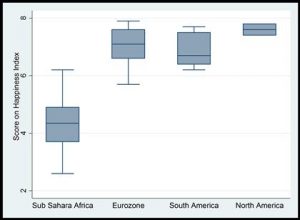In the Master African Studies, we often talk about (economic) development. Yet, what matters most is happiness. Therefore, I wanted to know if there is a relation between GDP per capita and happiness. In order to find out, I consulted the world database of happiness. A study was exerted to examine this and one of the conclusions has been visualised in the image presented below.

First and foremost, the image tells the reader that there is a trend between happiness and income. In the poorest region, sub Saharan Africa, happiness is lowest. In the two most rich areas, western Europe and northern America, happiness is highest. This trend is also confirmed by other research.
Yet, importantly, the statistics do not show how strong the correlation is. Given this trend, the correlation could be between 0.1 but it could also be 0.9. The implication of the correlation number is crucial for fully understanding what the relation between the two factors is.
Another important thing to be pointed out concerns to the definition of happiness. Historically, people have argued that it is not academically possible to properly research happiness because, according to them, defining happiness involved a high degree of subjectivity. For example, they argue that the perception of happiness differs per culture.
This is still a challenge to the study of happiness. Yet, scholars more and more acknowledge the study of happiness. Since the 1970s, research on happiness has been increasing and researchers argue that happiness can be researched in accordance with academic standards. The scientist that created the world database of happiness retrieved the subjective happiness of participants by simply asking them how happy they are with their life-as-a-whole.
In conclusion, the statistics show a trend between income and happiness. Yet, it does not tell the readers how happiness is defined and how strong the correlation is.


Mirjam de Bruijn
October 14, 2020 (16:39)
Interesting; this data presentation is very ‘suggestive’; did you find out about the definition of happiness they used? It is interesting because increasingly the whole idea of development is also related to well being and there are indeed many statistical records of wellbeing and relation to income or other more economic indicators.